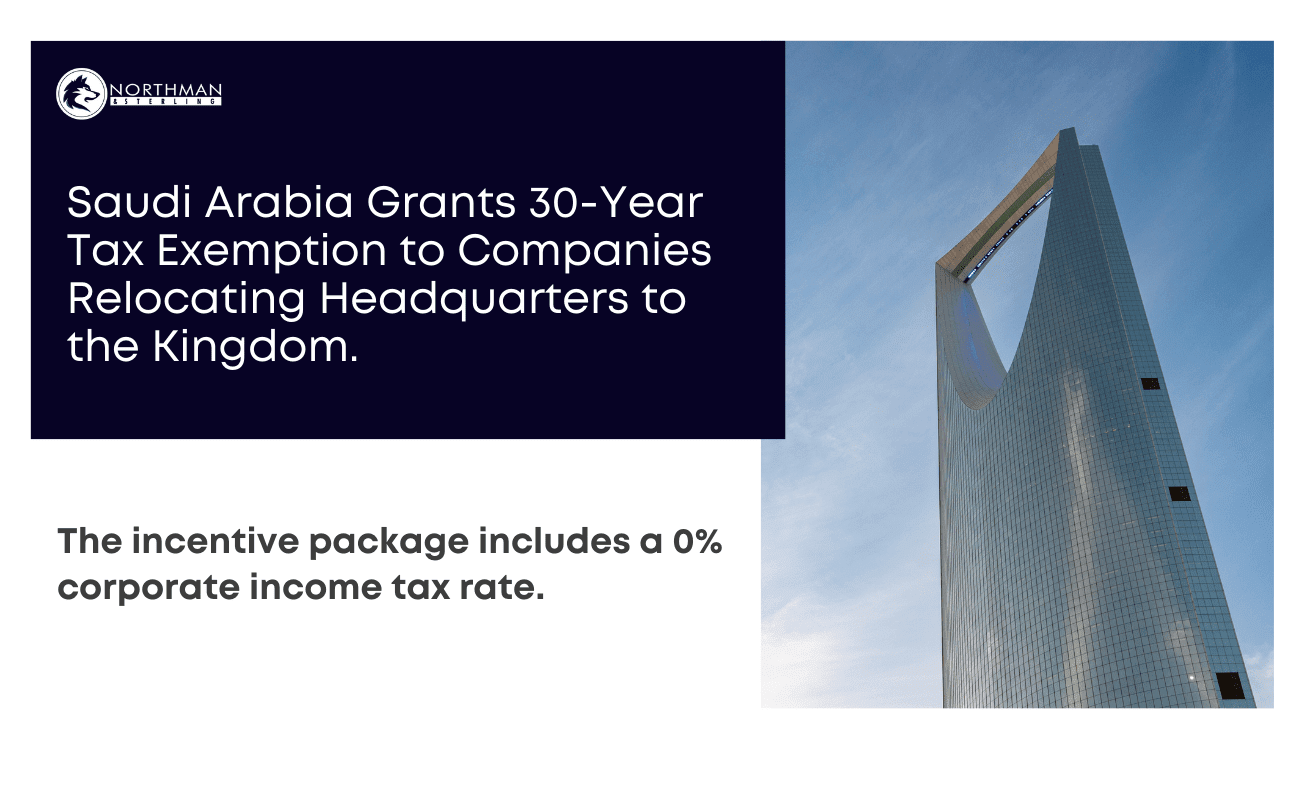- info@northmansterling.com

Saudi Arabia Grants 30-Year Tax Exemption to Companies Relocating Headquarters to the Kingdom
RHQ Programme: Gateway for Multinationals
Saudi Arabia’s Vision 2030 initiative takes a significant step by offering a 30-year tax exemption to multinational corporations establishing regional headquarters in Riyadh. This move, part of the Regional Headquarters (RHQ) Program, aims to position the Kingdom as a central business hub. The package includes a 0% corporate income tax rate and withholding tax for the designated regional entities, starting from the issuance of their licenses. This aligns with the country’s earlier decision to prioritize government contracts for international companies with regional headquarters in Saudi Arabia from 2024.
The Ministry of Investment and the Royal Commission for Riyadh City initiated the regional headquarters program. This program aims to attract multinational companies by offering a range of benefits and premium support services. Since 2021, more than 200 companies have obtained licenses through this initiative.
The Kingdom has taken a major step towards becoming a central business hub by granting a 30-year tax exemption to multinational companies setting up regional headquarters in Riyadh. In recent talks with the Ministry of Investment’s RHQ program head, concerns of multinational corporations (MNCs) have surfaced as the 2024 deadline approaches. This deadline requires MNCs to have a Saudi RHQ to engage with government agencies.
Saudi Tax Incentives Attract Global HQs
Khalid Al Falih, Minister of Investment, highlights how the tax incentive, along with relaxed Saudisation rules and spousal work permits, entices multinational companies to choose Saudi Arabia for their regional headquarters. The kingdom’s stability, skilled workforce, strategic location, and growth prospects have already made it a top pick for global firms. Executives and professionals increasingly see it as an ideal place to advance their careers. The Ministry of Investment imposes RHQ restrictions, including skill requirements and a minimum number of full-time employees. Companies struggling to meet these can seek exemptions through the Ministry.
Strategic Expansion in Saudi Arabia
For companies operating within a specific MENA country, establishing a subsidiary in Saudi Arabia is a strategic move with potential benefits. This allows them to maintain a legal presence dedicated to that country’s operations, facilitating participation in government tenders and navigating the evolving regulatory landscape while capitalizing on opportunities in the Saudi market.
Navigating Opportunities under Vision 2030
Recent Ministry of Investment updates offer multinational corporations (MNCs) a clear path. To align with Saudi Arabia’s goals, MNCs should understand the new rules and engage with the Ministry. As Saudi business practices align globally, MNCs have a clear opportunity to thrive under the ambitious goals of Vision 2030.
The Kingdom welcomes more MNCs to participate in projects across sectors, including giga-projects. This extends to preparations for hosting major events like the 2029 Asian Winter Games and Expo 2030.
